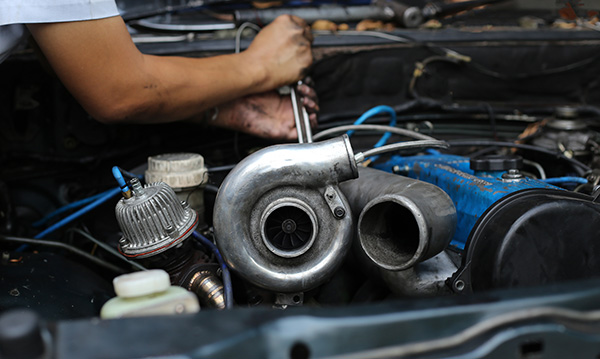
Turbochargers have become a key feature in modern vehicles, offering both increased power and improved fuel efficiency. Whether in sports cars, daily commuters, or even diesel trucks, turbochargers help engines generate more power without requiring a larger engine size. But how exactly do they work, and why are they so effective at boosting performance and fuel economy? Let’s see what makes turbochargers such a valuable addition to today’s vehicles.
What Is a Turbocharger
A turbocharger is a forced induction system that increases an engine’s power output by forcing more air into the combustion chamber. Unlike a naturally aspirated engine, which relies on atmospheric pressure to bring in air, a turbocharger uses exhaust gases to spin a turbine, which in turn compresses and pushes more air into the engine. More air means more oxygen, which allows the engine to burn more fuel and generate more power.
The turbo system consists of two main parts:
- The turbine side – This is connected to the exhaust system. As hot exhaust gases exit the engine, they spin a turbine, which powers the compressor.
- The compressor side – This part forces additional air into the engine, creating a more powerful combustion cycle.
By recycling exhaust gases and making better use of available fuel and air, turbochargers significantly enhance engine efficiency and power.
Boosting Performance Without a Bigger Engine
One of the biggest advantages of a turbocharger is that it allows smaller engines to produce power levels comparable to much larger engines. A turbocharged four-cylinder engine, for example, can generate as much horsepower as a naturally aspirated six-cylinder engine. This is why many manufacturers have shifted toward downsized, turbocharged engines—they deliver strong performance without the added weight and fuel consumption of a larger engine.
A turbocharger provides instant power when needed, which is especially beneficial for:
- Faster acceleration – Turbocharged engines generate more torque at lower RPMs, improving acceleration and responsiveness.
- Better towing capacity – Turbocharged diesel trucks, for example, use forced induction to produce high torque for heavy loads.
- Improved high-altitude performance – In areas like Broomfield, CO, where higher elevation reduces oxygen levels, a turbocharger helps maintain engine power by forcing in additional air.
How Turbochargers Improve Fuel Efficiency
While turbochargers are often associated with performance, they also play a key role in enhancing fuel efficiency. By using a smaller, turbocharged engine instead of a larger, naturally aspirated one, vehicles can achieve the same power output while consuming less fuel under normal driving conditions.
Here’s how turbochargers help improve fuel economy:
- Better engine efficiency – Because turbocharged engines extract more energy from fuel, they can generate the same power with less fuel consumption.
- Lower engine weight – A smaller, turbocharged engine is lighter than a larger naturally aspirated engine with the same power, improving overall efficiency.
- Cylinder deactivation and smaller displacement – Many modern turbocharged engines use cylinder deactivation technology, meaning they can shut off cylinders when extra power isn’t needed, further reducing fuel use.
When driven efficiently, turbocharged engines can deliver better fuel mileage than larger, naturally aspirated engines while still providing the power boost when needed.
Downsides of Turbocharged Engines
While turbochargers offer impressive benefits, they do require proper maintenance to stay in top condition. Some common concerns include:
Higher temperatures
Turbochargers generate a lot of heat, which can cause additional stress on engine components. Regular oil changes with high-quality synthetic oil are crucial to keeping the turbo system lubricated and cool.
Turbo lag
Some turbocharged engines experience a slight delay in power delivery as the turbo spools up. However, modern twin-scroll and electric turbos have significantly reduced this issue.
More maintenance requirements
Because they rely on additional components, turbocharged engines may require more frequent servicing than naturally aspirated engines.
Keeping Your Turbocharged Engine in Top Condition
To ensure your turbocharged vehicle performs at its best, follow these maintenance tips:
- Use high-quality synthetic oil and change it regularly to prevent buildup and overheating.
- Let the engine warm up before pushing it hard—this helps lubricate the turbocharger properly.
- Allow the engine to cool down before shutting it off, especially after driving at high speeds or towing. This prevents oil from burning inside the turbo, which can cause damage over time.
- Check for boost leaks or unusual engine noises, which may indicate a problem with the turbo system.
Maximize Your Turbo’s Performance with Expert Service
Turbochargers provide the perfect blend of power and efficiency, making them an excellent choice for modern vehicles. Whether you’re looking to boost performance or maintain your current turbocharged engine, regular servicing is key to keeping it running at peak performance.
For expert turbocharger maintenance, repairs, and upgrades, visit Rocky Mountain Car Care in Broomfield, CO. Our experienced technicians specialize in engine diagnostics and performance optimization to keep your car running.